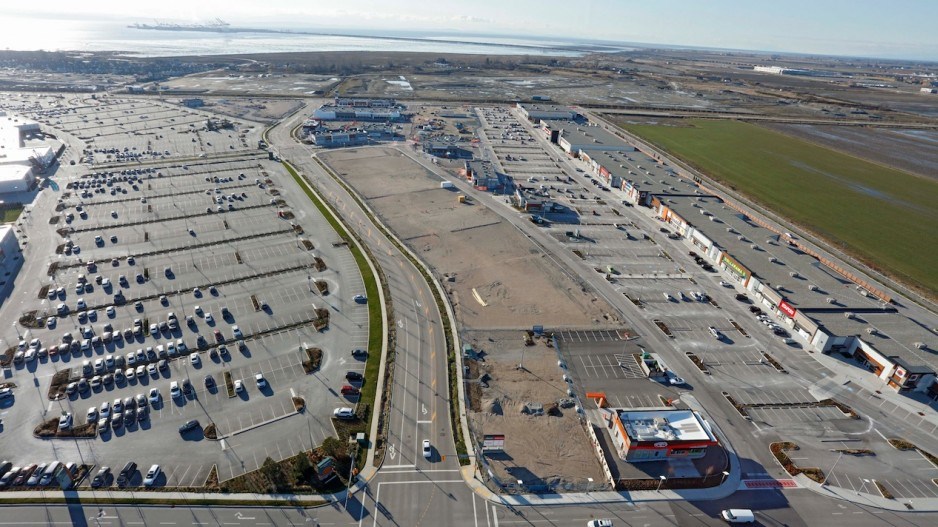Tsawwassen Commons – the second part of a Tsawwassen megamall development – is taking shape with many retailers recently signing leases and launching operations. As the final design starts to become clear, however, retail analysts are denouncing elements of the development, which includes more than 8,200 parking stalls.
About 6,000 of the stalls are at Ivanhoé Cambridge’s 1.2-million-square-foot Tsawwassen Mills shopping mall, which opened in October 2016 and, retail observers say, has not been very busy. Ivanhoé Cambridge would not provide traffic counts or share the mall’s sales per square foot with Business in Vancouver.
The remaining 2,200-plus parking spaces are across Canoe Pass Way from Tsawwassen Mills at the Tsawwassen Commons big-box strip mall. Its 303,000-square-foot first phase is 91% leased to stores such as Canadian Tire, Rona and Walmart, while construction is beginning on parts of what was originally intended to be a 217,500-square-foot Phase 2.
Developer Gracorp Capital Advisors Ltd.’s associate director of real estate, Novy Cheema, told BIV that he expects Tsawwassen Commons’ build-out to be completed by the end of 2019.
Recent arrivals include a Shell gas station, which opened in December, and an A&W that opened in January.
Club 16 Trevor Linden Fitness Centre signed a lease in early March for a 20,000-square-foot gym, and Cheema said it intends to start construction on that facility soon.
Stores expected to open within months include Menchie’s, Starbucks, Subway, Meraki Therapeutics, Live Well Exercise Clinic and Sally Beauty. By summer, the centre could have a Tim Hortons coffee shop, a Kal Tire and a liquor store; by year’s end, there is also expected to be a Simply Pho, Manna Grill and CEFA Early Learning daycare.
While retail analyst and Retail Insider Media owner Craig Patterson is impressed that the facility is able to attract tenants, he said he is “appalled” at the centre’s design.
“They took something that would have been regressive for Red Deer, Alberta, and plunked it down in the Lower Mainland, which has one of the worst housing crises anywhere,” Patterson said.
“It turns my stomach to look at an aerial view and see how close the ocean is. Tsawwassen is beautiful, and they’ve paved it over with this parking lot. I find it infuriating as I would have designed this so much differently.”
He added that in an era when self-driving cars are rapidly gearing up for mass public use, it is “crazy” to build a centre that relies on people driving and parking traditional vehicles.
The Tsawwassen First Nation (TFN) owns the land and is leasing it to developers on 99-year leases, chief Bryce Williams told BIV.
He defended the allotment of parking spaces as necessary.
“It’s a destination mall, so there’re a lot of people who come from the surrounding region,” he said.
“I’d say there’s a need for those parking spaces for those people. We struck a deal that we found to be very valuable for us. We’re happy with what we’ve pursued, and we’re glad for the opportunities that came out of it.”
The TFN expects to generate about $20 million in revenue in the 2017-18 fiscal year, or about double what it did five years ago. Williams said that revenue from the megamall would play a “significant” role in increasing future revenue.
Williams added that developers such as Executive Group Development, Aquilini Investment Group, Onni Group and Mosaic Homes plan to build a combined 2,800 homes between the mall and the ocean in the next 20 years. That would add approximately 6,000 residents near the mall.
About 275 single-family or coach homes have recently been built on the First Nation’s land, Williams said.
DIG 360 retail analyst and owner David Gray agreed with Patterson that the megamall has excessive parking but he disagreed that there would be much demand for highrise condominium towers on land that is now a parking lot.
“The parking spaces are probably designed for peak use and maybe there’d be peak use three days a year,” Gray said.
“It doesn’t cost them a lot to have the parking lots. From an ecological point of view it doesn’t look good, but there wouldn’t be an alternative use, other than farmland.” •




